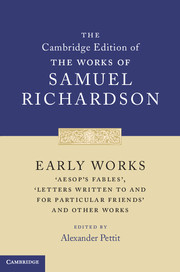Book contents
- Frontmatter
- Dedication
- Contents
- General Editors’ Preface
- Acknowledgements
- Chronology
- List of Abbreviations
- General Introduction
- Textual Introduction
- The Apprentice’s Vade Mecum (1733)
- A Seasonable Examination of the Pleas and Pretensions (1735)
- Preface to Aubin, A Collection of Entertaining Histories and Novels (1739)
- Aesop’s Fables (1739)
- Letters Written to and for Particular Friends (1741)
- Six Original Letters Upon Duelling (1765)
- Appendix: The Infidel Convicted (1731)
- Postscript
- Emendations
- Word-division
- Bibliographical Descriptions of Early Editions
- Explanatory Notes
- Index
Letter LXIV
Published online by Cambridge University Press: 30 June 2022
- Frontmatter
- Dedication
- Contents
- General Editors’ Preface
- Acknowledgements
- Chronology
- List of Abbreviations
- General Introduction
- Textual Introduction
- The Apprentice’s Vade Mecum (1733)
- A Seasonable Examination of the Pleas and Pretensions (1735)
- Preface to Aubin, A Collection of Entertaining Histories and Novels (1739)
- Aesop’s Fables (1739)
- Letters Written to and for Particular Friends (1741)
- Six Original Letters Upon Duelling (1765)
- Appendix: The Infidel Convicted (1731)
- Postscript
- Emendations
- Word-division
- Bibliographical Descriptions of Early Editions
- Explanatory Notes
- Index
Summary
Of Expostulation from a grave Friend to a young Man, on his slighting and irreverent Behaviour to his Father.
Dear Sir,
I take the Freedom of a brief Expostulation with you on your Behaviour to your Father; and I hope you will receive it from me, with the same Good-will, that I mean it.
His Indulgence to you formerly, certainly claims better Returns on your Part, altho’ it should be allow’d, as you fondly imagine, that his Affection to you is alienated. There may be something of Petulancy in him, which you ought to bear with; for one time or other you may be convinced by Experience, that Age itself has its insuperable Afflictions, that require the Allowance of every one; and more particularly of such who hope to live a long Life themselves, and still more particularly of a Son, whose high Passions, require, perhaps, at least as much Allowance. He may be petulant; but are you not fiery and impetuous? And I would fain know, whether you ought to bear with him, or he with you?
’Tis a very groundless Surmise to think his Affections are alienated from you. A Father must love his Son. He cannot help it. And is it credible even to yourself, on cool Reflexion, that the same good Man who was wont to be delighted with your childish Vanities and Foibles, (for we have all had them more or less) and even indulged and perhaps cherished those youthful Frowardnesses, that might be called the Seeds of those Passions, which now, being sprung up, give him so much Disturbance, and make you so impatient of Contradiction: Can you, I say, believe that this same good Man, without Reason, without Provocation, can change that Love into Hate?
You are grown to Man's Estate, and tho’ far from the ungracious Sons, that we have seen in the World, yet ought not to be so partial to yourself, as to believe you are wholly faultless. Examine your own Conduct then, and altho’ you should not be able to charge your Intention with any Blame, yet you must leave your Behaviour to be judg’d by others; and ‘twill perhaps be given against you, that some Slight, some Negligence, some Inattention, if not worse, too cutting for a Father's Cares and Fondness to support, has escaped you.
- Type
- Chapter
- Information
- Early Works'Aesop's Fables', 'Letters Written to and for Particular Friends' and Other Works, pp. 394 - 397Publisher: Cambridge University PressPrint publication year: 2011

